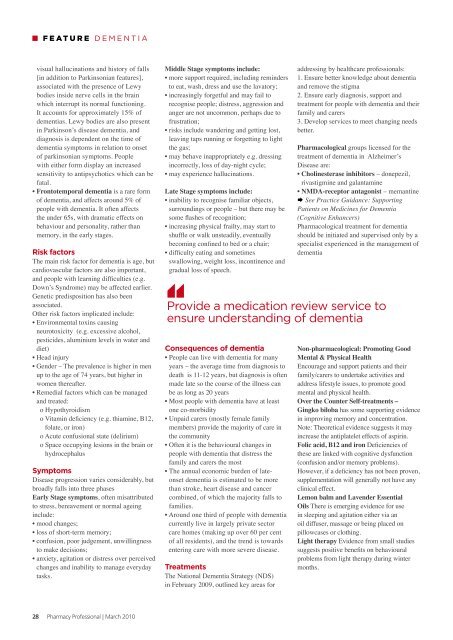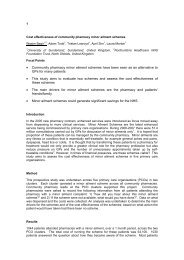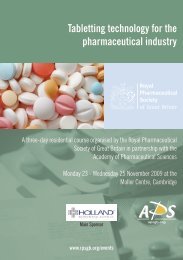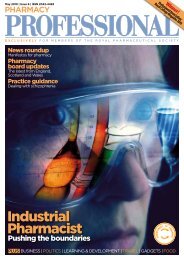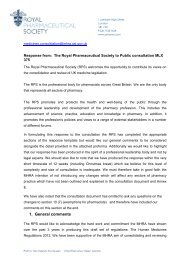pharmacists in secure environments - Royal Pharmaceutical Society
pharmacists in secure environments - Royal Pharmaceutical Society
pharmacists in secure environments - Royal Pharmaceutical Society
You also want an ePaper? Increase the reach of your titles
YUMPU automatically turns print PDFs into web optimized ePapers that Google loves.
f e at u r e d e m e n t i a<br />
visual halluc<strong>in</strong>ations and history of falls<br />
[<strong>in</strong> addition to Park<strong>in</strong>sonian features],<br />
associated with the presence of Lewy<br />
bodies <strong>in</strong>side nerve cells <strong>in</strong> the bra<strong>in</strong><br />
which <strong>in</strong>terrupt its normal function<strong>in</strong>g.<br />
It accounts for approximately 15% of<br />
dementias. Lewy bodies are also present<br />
<strong>in</strong> Park<strong>in</strong>son’s disease dementia, and<br />
diagnosis is dependent on the time of<br />
dementia symptoms <strong>in</strong> relation to onset<br />
of park<strong>in</strong>sonian symptoms. People<br />
with either form display an <strong>in</strong>creased<br />
sensitivity to antipsychotics which can be<br />
fatal.<br />
• Frontotemporal dementia is a rare form<br />
of dementia, and affects around 5% of<br />
people with dementia. It often affects<br />
the under 65s, with dramatic effects on<br />
behaviour and personality, rather than<br />
memory, <strong>in</strong> the early stages.<br />
Risk factors<br />
The ma<strong>in</strong> risk factor for dementia is age, but<br />
cardiovascular factors are also important,<br />
and people with learn<strong>in</strong>g difficulties (e.g.<br />
Down’s Syndrome) may be affected earlier.<br />
Genetic predisposition has also been<br />
associated.<br />
Other risk factors implicated <strong>in</strong>clude:<br />
• Environmental tox<strong>in</strong>s caus<strong>in</strong>g<br />
neurotoxicity (e.g. excessive alcohol,<br />
pesticides, alum<strong>in</strong>ium levels <strong>in</strong> water and<br />
diet)<br />
• Head <strong>in</strong>jury<br />
• Gender – The prevalence is higher <strong>in</strong> men<br />
up to the age of 74 years, but higher <strong>in</strong><br />
women thereafter.<br />
• Remedial factors which can be managed<br />
and treated:<br />
o Hypothyroidism<br />
o Vitam<strong>in</strong> deficiency (e.g. thiam<strong>in</strong>e, B12,<br />
folate, or iron)<br />
o Acute confusional state (delirium)<br />
o Space occupy<strong>in</strong>g lesions <strong>in</strong> the bra<strong>in</strong> or<br />
hydrocephalus<br />
Symptoms<br />
Disease progression varies considerably, but<br />
broadly falls <strong>in</strong>to three phases<br />
Early Stage symptoms, often misattributed<br />
to stress, bereavement or normal age<strong>in</strong>g<br />
<strong>in</strong>clude:<br />
• mood changes;<br />
• loss of short-term memory;<br />
• confusion, poor judgement, unwill<strong>in</strong>gness<br />
to make decisions;<br />
• anxiety, agitation or distress over perceived<br />
changes and <strong>in</strong>ability to manage everyday<br />
tasks.<br />
Middle Stage symptoms <strong>in</strong>clude:<br />
• more support required, <strong>in</strong>clud<strong>in</strong>g rem<strong>in</strong>ders<br />
to eat, wash, dress and use the lavatory;<br />
•<strong>in</strong>creas<strong>in</strong>gly forgetful and may fail to<br />
recognise people; distress, aggression and<br />
anger are not uncommon, perhaps due to<br />
frustration;<br />
• risks <strong>in</strong>clude wander<strong>in</strong>g and gett<strong>in</strong>g lost,<br />
leav<strong>in</strong>g taps runn<strong>in</strong>g or forgett<strong>in</strong>g to light<br />
the gas;<br />
• may behave <strong>in</strong>appropriately e.g. dress<strong>in</strong>g<br />
<strong>in</strong>correctly, loss of day-night cycle;<br />
• may experience halluc<strong>in</strong>ations.<br />
Late Stage symptoms <strong>in</strong>clude:<br />
• <strong>in</strong>ability to recognise familiar objects,<br />
surround<strong>in</strong>gs or people – but there may be<br />
some flashes of recognition;<br />
• <strong>in</strong>creas<strong>in</strong>g physical frailty, may start to<br />
shuffle or walk unsteadily, eventually<br />
becom<strong>in</strong>g conf<strong>in</strong>ed to bed or a chair;<br />
• difficulty eat<strong>in</strong>g and sometimes<br />
swallow<strong>in</strong>g, weight loss, <strong>in</strong>cont<strong>in</strong>ence and<br />
gradual loss of speech.<br />
Consequences of dementia<br />
• People can live with dementia for many<br />
years – the average time from diagnosis to<br />
death is 11-12 years, but diagnosis is often<br />
made late so the course of the illness can<br />
be as long as 20 years<br />
• Most people with dementia have at least<br />
one co-morbidity<br />
• Unpaid carers (mostly female family<br />
members) provide the majority of care <strong>in</strong><br />
the community<br />
• Often it is the behavioural changes <strong>in</strong><br />
people with dementia that distress the<br />
family and carers the most<br />
• The annual economic burden of lateonset<br />
dementia is estimated to be more<br />
than stroke, heart disease and cancer<br />
comb<strong>in</strong>ed, of which the majority falls to<br />
families.<br />
• Around one third of people with dementia<br />
currently live <strong>in</strong> largely private sector<br />
care homes (mak<strong>in</strong>g up over 60 per cent<br />
of all residents), and the trend is towards<br />
enter<strong>in</strong>g care with more severe disease.<br />
Treatments<br />
The National Dementia Strategy (NDS)<br />
<strong>in</strong> February 2009, outl<strong>in</strong>ed key areas for<br />
address<strong>in</strong>g by healthcare professionals:<br />
1. Ensure better knowledge about dementia<br />
and remove the stigma<br />
2. Ensure early diagnosis, support and<br />
treatment for people with dementia and their<br />
family and carers<br />
3. Develop services to meet chang<strong>in</strong>g needs<br />
better.<br />
Pharmacological groups licensed for the<br />
treatment of dementia <strong>in</strong> Alzheimer’s<br />
Disease are:<br />
• Chol<strong>in</strong>esterase <strong>in</strong>hibitors – donepezil,<br />
rivastigm<strong>in</strong>e and galantam<strong>in</strong>e<br />
• NMDA-receptor antagonist – memant<strong>in</strong>e<br />
Æ See Practice Guidance: Support<strong>in</strong>g<br />
Patients on Medic<strong>in</strong>es for Dementia<br />
(Cognitive Enhancers)<br />
Pharmacological treatment for dementia<br />
should be <strong>in</strong>itiated and supervised only by a<br />
specialist experienced <strong>in</strong> the management of<br />
dementia<br />
Provide a medication review service to<br />
ensure understand<strong>in</strong>g of dementia<br />
Non-pharmacological: Promot<strong>in</strong>g Good<br />
Mental & Physical Health<br />
Encourage and support patients and their<br />
family/carers to undertake activities and<br />
address lifestyle issues, to promote good<br />
mental and physical health.<br />
Over the Counter Self-treatments –<br />
G<strong>in</strong>gko biloba has some support<strong>in</strong>g evidence<br />
<strong>in</strong> improv<strong>in</strong>g memory and concentration.<br />
Note: Theoretical evidence suggests it may<br />
<strong>in</strong>crease the antiplatelet effects of aspir<strong>in</strong>.<br />
Folic acid, B12 and iron Deficiencies of<br />
these are l<strong>in</strong>ked with cognitive dysfunction<br />
(confusion and/or memory problems).<br />
However, if a deficiency has not been proven,<br />
supplementation will generally not have any<br />
cl<strong>in</strong>ical effect.<br />
Lemon balm and Lavender Essential<br />
Oils There is emerg<strong>in</strong>g evidence for use<br />
<strong>in</strong> sleep<strong>in</strong>g and agitation either via an<br />
oil diffuser, massage or be<strong>in</strong>g placed on<br />
pillowcases or cloth<strong>in</strong>g.<br />
Light therapy Evidence from small studies<br />
suggests positive benefits on behavioural<br />
problems from light therapy dur<strong>in</strong>g w<strong>in</strong>ter<br />
months.<br />
Practice Po<strong>in</strong>ts<br />
for Pharmacists<br />
• Identify people possibly at risk. All<br />
people concerned about memory<br />
impairment; los<strong>in</strong>g objects (keys,<br />
wallets etc) should be signposted to<br />
their GP or specialist memory services<br />
• Offer educational support and<br />
advice and ensure the patient and/<br />
or carer understands how their<br />
medication works and the importance<br />
of cont<strong>in</strong>u<strong>in</strong>g to take them. Reassure<br />
them about any concerns such as side<br />
effects and refer as appropriate.<br />
• Signpost to organisations that can<br />
support their educational needs and<br />
prepare them for the future - support<br />
may also be required with advance<br />
directives, wills, f<strong>in</strong>ances and the<br />
home environment.<br />
• Poorly compliant patients may<br />
benefit from a once daily preparation<br />
(particularly <strong>in</strong> polypharmacy) and/or<br />
use of compliance aids with support.<br />
Provide family / carers with advice to<br />
support compliance.<br />
• Swallow<strong>in</strong>g difficulties: consider<br />
alternative formulations for patients<br />
with swallow<strong>in</strong>g difficulties and/or<br />
problems with dose titration.<br />
• Offer a prescription collection and<br />
delivery service<br />
• Encourage self-care <strong>in</strong> terms of<br />
<strong>in</strong>creas<strong>in</strong>g exercise, tak<strong>in</strong>g part <strong>in</strong><br />
social activities and do<strong>in</strong>g activities,<br />
which stimulate bra<strong>in</strong> function, such<br />
as crossword puzzles, jigsaw puzzles<br />
or Sudoko.<br />
• Alcohol should be avoided – due to<br />
added effects of drows<strong>in</strong>ess<br />
• Check for <strong>in</strong>teractions <strong>in</strong>clud<strong>in</strong>g<br />
OTC remedies. See www.bnf.org for<br />
<strong>in</strong>teractions.<br />
•G<strong>in</strong>gko biloba: Concomitant use of<br />
aspir<strong>in</strong> may <strong>in</strong>crease its antiplatelet<br />
effects (avoid comb<strong>in</strong>ation or use<br />
cautiously). Ensure the patient’s<br />
prescriber is aware if g<strong>in</strong>kgo biloba<br />
is be<strong>in</strong>g taken and any signs of<br />
<strong>in</strong>creased bruis<strong>in</strong>g are <strong>in</strong>vestigated.<br />
• Establish l<strong>in</strong>ks with the local<br />
Dementia Advisor for liaison – to<br />
support people <strong>in</strong> local community<br />
with dementia, to reduce stigma<br />
associated with the illness and to<br />
promote the early recognition of<br />
signs and symptoms with appropriate<br />
referral.<br />
The National Dementia Strategy promotes<br />
the implementation of a local Dementia<br />
Advisor to provide support and <strong>in</strong>formation<br />
as and when it is needed. The emphasis<br />
is on proactive engagement of healthcare<br />
professionals rather than a response to a<br />
person who is <strong>in</strong> distress and no longer<br />
cop<strong>in</strong>g. Pharmacists by promot<strong>in</strong>g good<br />
mental and physical health activities can<br />
further help improve the quality of life for<br />
people with dementia and their families.<br />
Levels of pharmaceutical care<br />
services for support<strong>in</strong>g patients<br />
with dementia<br />
In general <strong>pharmacists</strong> can:<br />
• Recognise possible symptoms of dementia<br />
especially when respond<strong>in</strong>g to symptoms<br />
and refer as appropriate<br />
• Provide lifestyle advice and support<br />
• Signpost to local and/or national support<br />
resources.<br />
Æ See Useful Resources section<br />
Level 1: Pharmacists can:<br />
• Provide a medication review service<br />
to ensure understand<strong>in</strong>g of dementia by<br />
patient and/or their family/carers; provide<br />
treatment support; and address any side<br />
effects and adherence problems. Patients<br />
receiv<strong>in</strong>g their dementia medication from<br />
secondary care services for the first time<br />
may not have had access to pharmacist<br />
advice and support .<br />
Level 2: Pharmacists can offer:<br />
• Support for healthy lifestyle <strong>in</strong>terventions<br />
(for patients and/or family/carers),<br />
<strong>in</strong>clud<strong>in</strong>g:-<br />
Smok<strong>in</strong>g cessation counsell<strong>in</strong>g and<br />
provision of nicot<strong>in</strong>e replacement therapy<br />
(NRT)<br />
Advice on use of use of alcohol: NHS<br />
Choices: http://www.nhs.uk/Livewell/<br />
over60s/Pages/Tipsforcutt<strong>in</strong>gdown.aspx<br />
Diet and exercise support and advice -<br />
see Top Tips for eat<strong>in</strong>g more fruit and<br />
vegetables at http://www.5aday.nhs.uk/<br />
topTips/default.html<br />
Vascular risk checks and weight<br />
management<br />
• <strong>Pharmaceutical</strong> care of vulnerable patients<br />
e.g. daily dispens<strong>in</strong>g; compliance charts;<br />
monitored dose systems<br />
• Recognise symptoms of decl<strong>in</strong><strong>in</strong>g<br />
cognitive function: poor function<strong>in</strong>g <strong>in</strong><br />
activities of daily liv<strong>in</strong>g (e.g. wash<strong>in</strong>g,<br />
dress<strong>in</strong>g, self neglect, poor repeat<br />
collection, behavioural and mood changes)<br />
and liaise with the community mental<br />
health team, the GP and/or specialist<br />
services to optimise patient care.<br />
• Support the local Dementia Advisor -<br />
provision of pharmaceutical care education<br />
and <strong>in</strong>formation <strong>in</strong> dementia management.<br />
• Review of <strong>in</strong>appropriate prescrib<strong>in</strong>g of<br />
antipsychotics<br />
Level 3 Specialist Mental Health Level;<br />
Pharmacists role <strong>in</strong> effective care for<br />
those with dementia<br />
Pharmacist Prescribers; Pharmacists with<br />
Special Interest; or those with appropriate<br />
<strong>in</strong>terest, tra<strong>in</strong><strong>in</strong>g and support could develop<br />
an <strong>in</strong>tegrated service with colleagues <strong>in</strong><br />
secondary care - <strong>in</strong>clud<strong>in</strong>g prescrib<strong>in</strong>g,<br />
diagnosis and support<br />
Other specialist <strong>pharmacists</strong> e.g. work<strong>in</strong>g<br />
<strong>in</strong> care homes, community or <strong>in</strong>termediate<br />
care hospitals could also support the earlier<br />
recognition of the illness and appropriate<br />
referral<br />
Pharmacists can:<br />
• Provide early-symptom detection<br />
assessments with referral to a specialist<br />
as appropriate (with appropriate required<br />
tra<strong>in</strong><strong>in</strong>g) e.g. Folste<strong>in</strong> M<strong>in</strong>i Mental State<br />
Exam<strong>in</strong>ation.<br />
• Provide medic<strong>in</strong>e education sessions<br />
• Monitor response and side effects<br />
• Suggest therapeutic change if poor<br />
response<br />
• Prescribe (if appropriately tra<strong>in</strong>ed) <strong>in</strong><br />
collaboration with healthcare team and<br />
Community Mental Health Team if<br />
appropriate<br />
• Provide (if appropriately tra<strong>in</strong>ed) support<br />
on non-pharmacological treatments<br />
• Support commissioners <strong>in</strong> service redesign<br />
so that medic<strong>in</strong>es management is<br />
<strong>in</strong>tegral to care pathways.<br />
Æ<br />
28 Pharmacy Professional | March 2010 March 2010 | Pharmacy Professional 29


